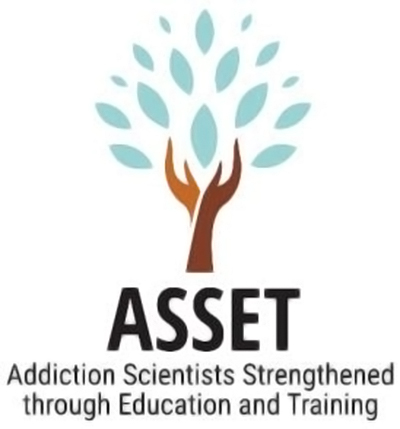Overview
What is ASSET?
A substance use research training and education program focused exclusively on supporting Black and/or Latinx junior faculty.
ASSET provides research knowledge, skills, and mentored career development training to build faculty confidence and resilience to become independent scientists and leaders in substance use research.
Funding supports up to 6 fellows per year for a summer (12-week) structured training program in:
- ‘Hard skills’ – e.g., manuscript and grant writing, grantspersonship, presentation skills, community-engaged substance use research, and responsible conduct of research with substance-affected communities
- ‘Soft skills’ – e.g., network-building, mentoring, negotiation, and managing issues commonly faced by underrepresented minority investigators (‘impostor syndrome,’ service overburden)
ASSET will also promote the transition to independent research by offering ASSET fellows peer-reviewed developmental ‘seed’ grants and travel grants for them to gain critical, hands-on, professional experience on the formulation and execution of a successful research study.
What are the main milestones for ASSET fellow to achieve?
The Mentoring Teams will support the Fellow’s completion of a Grant Proposal (e.g., K-series or R21 grant application), and Research Project (e.g., manuscript based on secondary data analysis), as well as provide career development training.
- Grant Proposal: Through the grant writing workshop portion of ASSET, Fellows are expected to generate a research proposal in the form of a K-series or R21 grant application in response to a
NIH program announcement. Proposals will undergo a mock NIH grant review at the end of the summer training period to allow fellows to receive constructive feedback from other experts in the field prior to NIH submission. Fellows will be matched with and will meet with their Mentoring Team prior to the ASSET summer training period to allow for ample time to generate ideas around the appropriate NIH grant mechanism and specific aims for the grant proposal. - Research Project: Fellows will collaborate with their mentoring team to develop a manuscript suitable for publication. The Research Project can include, for example secondary data analysis and manuscript with mentor team as co-authors. The research project/manuscript can be completed in the 12 months after the ASSET summer training period at the Fellow’s home institution.
Where does the program take place?
As a hybrid format program, in 2022 the structured training period of ASSET will take place over 10 weeks during the summer (June 7 to August 13) and will include in-person orientation activities at SDSU and UCSD during Week 1 (June 7 – June 11), and closing activities during Week 10 (August 9 – August 13). Additional research training and completion of ASSET program research project will take place remotely from the scholar’s home institution.
Applicant Eligibility
Junior faculty at the Assistant Professor level who are Black or African American and/or Latinx or Hispanic. Candidates should be interested in pursuing a research career related to substance use/addiction science. Applicants must be U.S. citizens.
Dates and Deadline Information
Applications will be accepted starting December 1st. 2023 until March 1st 2024.
ASSET Pilot Grant applications are accepted on a rolling basis, up to one year after the completion of the summer training period. For example, ASSET 2023 fellows may submit an application once they begin the summer training period, but no later than August 31st 2024.
If a fellow is interested in applying for ASSET Pilot Grant funding after their one-year window has closed, they may submit an exception request to the ASSET Co-Directors, Drs. Zúñiga and Pitpitan.
/google-calendar
